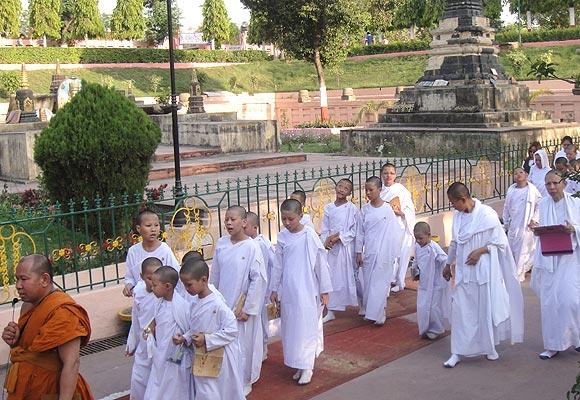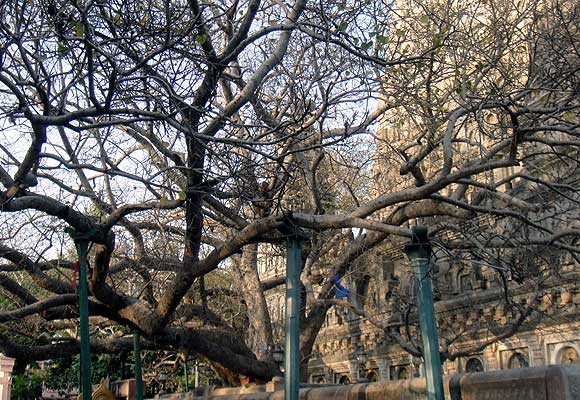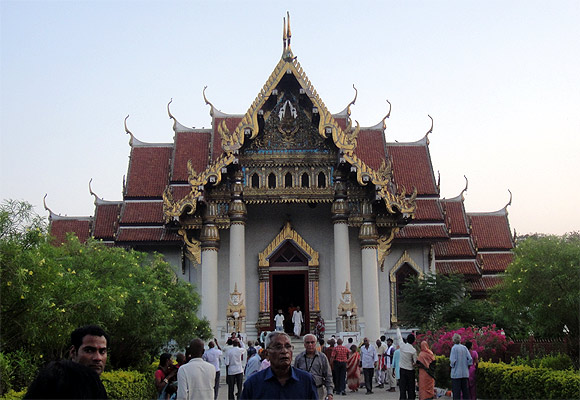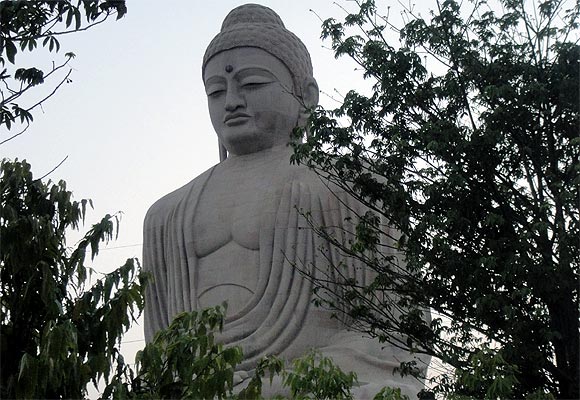 | « Back to article | Print this article |
Mahabodhi: What kind of savages attack a symbol of peace?
‘My lasting image of the Mahabodhi temple was a group of white-robed child monks walking in reverence around the Mahabodhi tree, whose giant branches were supported by poles. On Sunday, when bombs ripped through those sacred grounds, it made me think… What kind of savages must be those who attacked one of the most peaceful places on earth?’
Archana Masih looks back on a memorable visit to the Mahabodhi temple in Bodh Gaya, the holiest pilgrimage centre for Buddhists.
The rays of the setting sun filtered through the branches of the Mahabodhi tree in the heart of the Mahabodhi temple complex in Bodh Gaya. It was a warm April evening and making their way behind me was a group of child monks in white robes. They followed a senior monk, chanting verses over a mike, and stopped at certain spots to hear him explain.
The great Mahabodhi tree was dry, its branches bare after shedding its leaves. The security guard there tells me that the tree will sprout leaves again in a few weeks. Long poles stood holding some of its sprawling branches, providing additional support to the revered Peepul tree that is perhaps the fifth generation of the original sapling.
It was under this tree that Prince Siddhartha meditated to attain enlightenment at the age of 35 and came to be known as the Buddha, the Enlightened One.
From here, he set out to spread his teachings to the world, and it is here his disciples return in their ultimate homage to the Great One. The Mahabodhi temple and Bodh Gaya are for Buddhists what Mecca is for Muslims or Bethlehem for Christians.
Please click on NEXT to read further...
Mahabodhi: What kind of savages attack a symbol of peace?
A group of Burmese women tell me in broken English that their life’s worth is complete after making this trip to Bodh Gaya. “We must make this journey in our lifetime,” says one of them, making a point to mention how their country’s icon, Aung San Suu Kyi, came to India to study.
The Mahabodhi temple is Bodh Gaya’s focal point. Dating back to the times of King Ashoka and the Gupta rulers, the temple commemorates seven other places where the Buddha meditated after attaining Nirvana.
In its lawns, under the Mahabodhi tree and by the other sacred spots in the premises, sit pilgrims in meditation. They spread their mats, chant from verses inscribed on cloth or sit in silent meditation. Some meditate through the night sitting under small netted tents in the premises after getting permission from the temple authorities for a small fee and showing valid documentation like a passport.
Please click on NEXT to read further...
Mahabodhi: What kind of savages attack a symbol of peace?
It is a place of unique peace, providing calm to people of various faiths. One can sit on a patch in the complex for hours without uttering a word, watching pilgrims drawn from the far reaches of India, Sri Lanka and the Far East. People from different countries, speaking diverse languages as they congregate in Buddhism’s most sacred ground.
The pilgrim town is dotted with monasteries built by different countries -- China, Japan, Bhutan, Thailand, Burma, Nepal, Tibet, Vietnam etc -- all built in the architecture of the home country. Pilgrims from these countries most often stay in their home monasteries, comfortable with the cuisine, language and culture.
Local hotels say the preference of foreign pilgrims for monastery accommodation takes away business to a certain extent. Tourists also do not stay beyond two days or so because the town has not been developed with any other attraction, around the Buddhist pilgrimage sites, to draw tourists.
Please click on NEXT to read further...
Mahabodhi: What kind of savages attack a symbol of peace?
Tourism in Bihar mainly means Bodh Gaya. The tourist season is at its peak from October to February. While Buddhists come because it is the epicentre of Buddhist pilgrimage, Hindus come to perform pind daan for the salvation of the souls of their ancestors.
“Both Buddhists and Hindus come here because they have to. They are drawn here because this is important for their faith -- given a choice and alternative, they honestly won’t come. Foreigners come by chartered flights, they don’t step out of the temple or the monasteries. They finish their pilgrimage and leave. They do not spend any money here because there is nothing else here to do. They do not stay back for anything else,” says a state official.
During the Kaal Chakra of 2012, Bodh Gaya saw more tourists than Goa, where even small homes were being let out as bed and breakfast accommodation. “The temple is the main reason why people come. The temple is everything here,” the official had reiterated.
Please click on NEXT to read further...
Mahabodhi: What kind of savages attack a symbol of peace?
The blasts in the Mahabodhi temple complex happened in the morning of Sunday, and the next day the temple had once again opened to pilgrims. It is said that this was the first time that the temple, a world heritage site going back to the third Century BC, was closed for pilgrims.
It’s a shame that terrorists struck the heart of one of the world’s most peaceful sites, whose founder underwent extreme mental and physical pain to end human suffering. What kind of savages attack such a beacon of peace?




